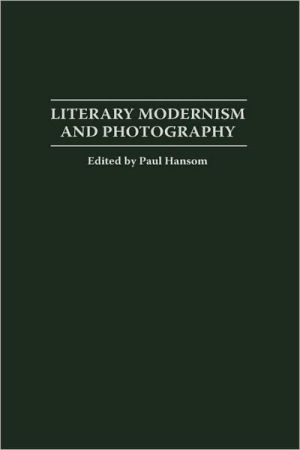

 |

|

The average rating for Literary Modernism And Photography based on 2 reviews is 2.5 stars.
Review # 1 was written on 2013-09-04 00:00:00 Michael Plante Michael PlanteI just read his 'Polemic' chapter on anti-Semitism in John, where he looks at John 8:31-59 as 'satirical', and shows that Jesus (in the passage) is not against the Jewish people in general, or as a whole, but condemning a particular group of Jews who exemplify a particular kind of unbelief. The chapter was highly engaging, and I really enjoyed reading it. I will definitely come back to the book when I return to John's gospel (though I must admit I'm much more interested in the Synoptics!). It's a good case study for Hermeneutics and interpretation. I also wanted to mention that I enjoyed his contextual understand of the purpose of John's gospel in light of the conflict between Jews and 'Christian heretics' in which Rabbi Gamaliel II (85 C.E.) reformulated the twelve benedictions, and Christians in the diaspora were no longer able to worship in the synagogues. He writes: 'John's gospel, it is argued, reflects this milieu and was written mainly to encourage Jewish Christians to keep believing in Jesus after the traumatic, social bereavement which they faced' (126). And this plays well into his understanding of John 8:31-59 as reflecting both an incident in the ministry of the historical Jesus (Matthew 3:7-10) and the Sitz im Leben of the Johannine community. However, I'm not convinced that Jesus is only condemning the 'apostates' (those who have believed in Jesus yet turned on him when the going got tough), though I do agree that John/Jesus refers to a particular group of Jews, and not Jews in general (for one, Judaism was much too diverse for that! See L.T. Johnson's 'The New Testament's Anti-Jewish Slander and the Conventions of Ancient Polemic'). Rather, it seems (though this is from the wider context of the Synoptics - but maybe that's unfair since this a study of John!) that Jesus is condemning those Jews who do not respond to Jesus in repentance for their disobedience as a nation (particularly the leaders; Jesus lives in solidarity with those who have been subjected to the oppression of the leaders, and they will be accepted when his kingdom is restored/inaugurated). They haven't been a royal priesthood. They haven't practiced social justice. They haven't practiced Jubilee. They haven't been a 'light to the nations.' And because God is good, he will do something about it. This is all over the prophets, and centred in the Torah (if you obey, blessing; if you disobey, curse/exile) and is at the heart of what it means to be Jewish, a 'child of Abraham', and is therefore far from anti-Semitic. It's not anti-Jew, but pro-Jew; but the true Jews, the true Israel, the true children of Abraham are those who respond in obedience to God through the faithfulness of Jesus. And most importantly, those who are the true Israel have no grounds for oppression or anti-Semitism. 'If you hold to my teachings, you really are my disciples. Then you will know the truth, and the truth will set you free' (8:31-32). As Stibbe says, 'This is the language of liberation not of oppression'. And I wholeheartedly adhere with his final paragraph! I would love to engage with you on this idea (if you've read the book), so please comment your thoughts in the comments below. One other issue would be that he doesn't use ancient sources to argue that the satirical nature of John (besides saying, 'The tone, structure setting and characterisation of this episode all point to the kind of informal satire which was common in the early Christian Era. Indeed, such informal satire was being perfected by the Roman poet Juvenal, at exactly the same time as John was publishing his gospel at the end of the first century', 129). He tends to use twentieth century sources. That would have solidified his argument better, but I am convinced despite this weakness. I recommend reading it alongside N.T. Wright's teaching on the Jews in the Gospels and Paul's letters. |
Review # 2 was written on 2010-06-10 00:00:00 Roy Copeland Roy Copeland18 essays on insect studies - gives me ample to think about. Favourite quote (referring to the feminization of insects) a female termite in particular: "The king-or let us call him the prince-consort - is shabby, undersized, punitive, fearful, furtive, and always hiding underneath the queen…SHe is merely a gigantic belly, crammed to bursting with eggs…an enormous, flabby, inert greasy whitish mass; an appalling idol. Thousands of worshippers are incessantly licking and fondling the monster." - Maurice Maeterlinck (1862-1949). So many images to process increasing in intensity! |
CAN'T FIND WHAT YOU'RE LOOKING FOR? CLICK HERE!!!